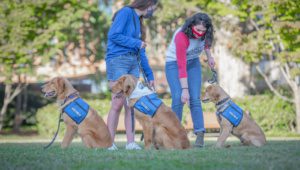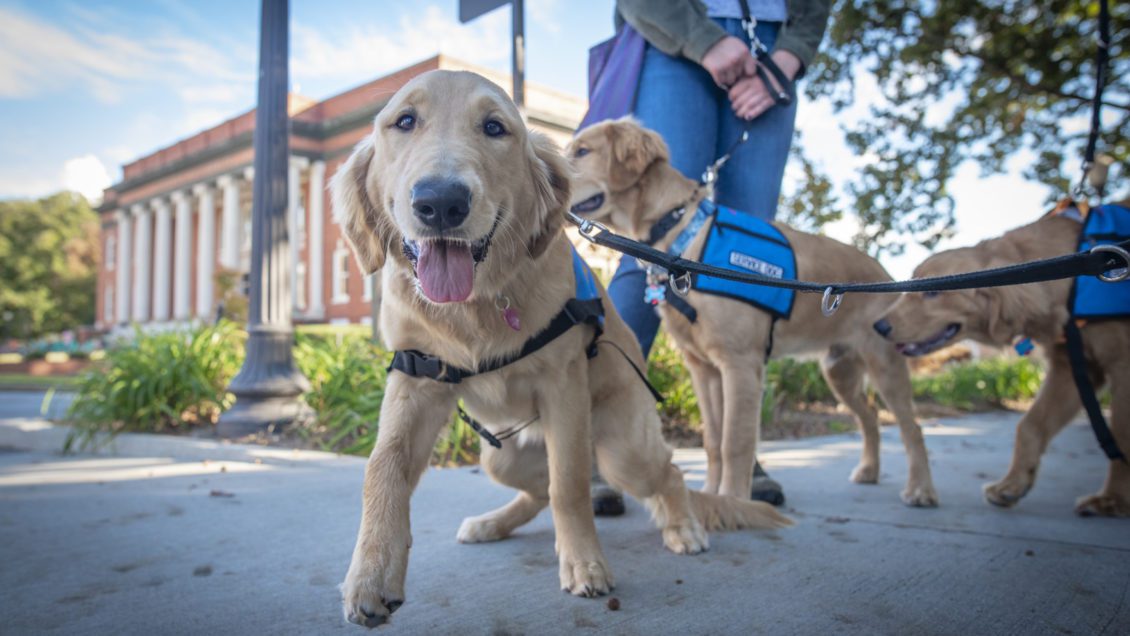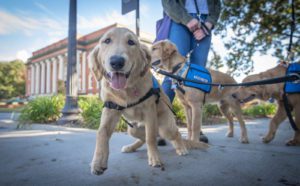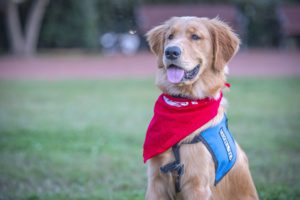Three handsome brothers reunited for a photo shoot on the Clemson campus on October 23, but had a hard time sitting still for the cameras. The three energetic siblings were seven-month-old golden retrievers named Cooper, Riggs and Bowman. They were escorted by Clemson animal and veterinary sciences majors Marena Fleming, Grace White and Dana Galvin, who have committed to fostering the dogs for a year for Battle Buddies, a Simpsonville-based nonprofit that trains service dogs and then gifts them to veterans suffering from post-traumatic stress syndrome (PTSD).
Jo Ann Creed, who founded Battle Buddies with her husband John in 2012, said teaming the dogs with Clemson students has turned out to be a brilliant idea. She said the main goal in the first year is to get the pups socialized and used to being around people, and the college environment lends itself perfectly to that.
“Believe it or not the easiest part is teaching the dogs the tasks for PTSD,” she said. “The hard part is to socialize them, and for that you can’t copy this kind of environment. For them to be around other students, live in a dorm and be out on campus every day . . . to expose them to that kind of noise and sounds and different textures – you can’t replicate that. It prepares these dogs for every situation with their veterans, and we also have a lot of vets who will go back to school, so it just makes sense on so many levels.”
Battle Buddies puppies begin training at eight weeks old and are placed with their veteran around 18 months. Creed said the dogs will know 33 commands by the time they are ready to go to their veteran.

“This is the first dog I’ve ever had in my life,” said Fleming, a sophomore from Gilbert, South Carolina who is fostering Cooper. “He’s my roommate this year and I already know it’s going to be hard to part with him, but my dad is a Navy veteran, so I know it will be worth it.”
It’s also the first dog for Galvin, a senior from Asbury Park, New Jersey who is fostering Bowman. She said the not-so-little pup (at seven months he weighs more than 55 pounds already) never fails to fill faces with smiles anywhere she brings him.
“I take him everywhere I can with me, and nobody is ever not happy to see him,” she said.
The puppies may all look the same, but they all have distinctive personalities, said Creed. Cooper, for instance, seemed like the big brother of the bunch, pouncing on his two brothers to instigate wrestling matches. Bowman seemed to be the more curious of the three, constantly sticking his nose in the photographer’s camera lens, and Riggs was the more subdued one, happy to sit and offer his head for pets and ear scratches.
“We try to place the right dog personality with the right veteran,” said Creed.
The program at Clemson is a first for Battle Buddies, and Creed said they hope to expand it in the next few years. This year they have five dogs in training, with plans to train seven next year. She and her husband, who is a Marine veteran, are in the process of building a training facility in Piedmont which will offer an on-sight training program that will also be used as a retreat for veterans. In the meantime, she believes she’s found the perfect partners in Fleming, White and Galvin and the greater Clemson Family.
“Clemson’s been wonderful about it, and I am really enjoying these girls. Being veterinary majors, they are just so serious and dedicated to this. They’re like family now,” said Creed. “I think it’s something that might help them when they apply to vet school. It kind of sets them apart to be involved with a service like this.”
Creed said it costs about $7,000 to train each service dog, but they are provided to their veterans free of charge.
The name Battle Buddies comes from an Army term passed on to the Creeds by their son Ryan, an Army veteran who served in the 82nd Airborne Division. In the modern Army, it is standard operating procedure for every soldier to have a “Battle Buddy,” in other words another soldier with them wherever they go, so they are never alone. The requirement was initially for deployed soldiers, but spread to troops stationed in-country with the increasing PTSD and suicide rates among service members returning from the wars in Iraq and Afghanistan.
Get in touch and we will connect you with the author or another expert.
Or email us at news@clemson.edu



